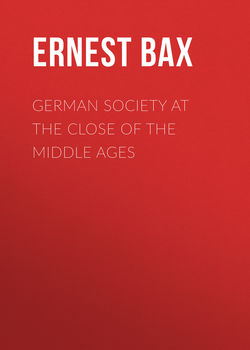Читать книгу German Society at the Close of the Middle Ages - Bax Ernest Belfort - Страница 1
ОглавлениеPREFACE
The work, of which the present volume is the first instalment, aims at giving English readers a general view of the social condition and the popular movements of Germany during the period known as that of the Reformation. In accordance with this plan, I have only touched incidentally upon the theological disputes then apparently uppermost in the thoughts of men, or upon the purely political side of things. They are dealt with merely in so far as they immediately strike across the path of social and internal affairs. The present volume, which has a more general character than its successors, deals with a period limited, roughly speaking, by the closing years of the fifteenth century on the one side, and by 1525, the year of the great Peasant rising, on the other. It contains a narrative of the earlier popular revolutionary movements at the close of the Middle Ages, the precursors of the Peasants' War; and it also deals with the underlying causes, economic, social and juridical, of the general disintegration of the time.
The next volume will treat more in detail the events of the years 1524 to 1526. The third will contain a history of the Anabaptist Movement in Central Europe from its rise at Zwickau in 1522 to its decline after the capture of Münster by the Archiepiscopal and Imperial troops in 1536. The reign of the Saints in Münster naturally forms the leading feature of this portion of the work.
As to the sources for the history of the Germany of this period, I have endeavoured to incorporate everything available that seemed to me important for the proper understanding of the time. The three chief general histories of the Reformation, Ranke's Geschichte Deutschlands während der Reformations-Zeit, Janssen's Geschichte des Deutschen Volkes, and Egelhaaf's Deutsche Geschichte im sechszehnten Jahrhundert, have, it is scarcely necessary to say, been laid under contribution. The standpoint of Ranke, whose history is detailed and in certain respects exhaustive, is that of general bourgeois Philistinism. Janssen represents the Ultramontane Catholic view; but, apart from its tendency, every one must admire the brilliant and in most cases accurate scholarship that characterises it. Egelhaaf's work may be regarded as the counterblast to Janssen's. Its point of view is that of "liberal," middle-class German Protestantism; but it also contains many hints and clues which may be followed up by the industrious historian.
To rewrite history in the light of the researches of the later decades of the nineteenth century will be the great task of the next two or three generations. History has to be presented afresh on the basis of primitive communism with its tribal and village groups, with its sexual relations based on the gens, with its totemistic religious conceptions, and from the standpoint of a continuous development from these beginnings up to the individualism of the present day founded on the complete disruption of early society.
The average student of any historical period invariably reads into his interpretation the intellectual, moral and social atmosphere that lies nearest to him. He cannot strip away the intervening time-content between himself and the period in question. It is the most difficult of all exercises of the imagination, and to most men, indeed, impossible, to realise that the same words, names, customs and institutions connote totally different actualities in different stages of historic evolution. People fail to conjure up the altered perspective, and the unfamiliar background on which men lived, thought and felt in another age. Agamemnon, "King of Men," is to them Kaiser Wilhelm differently made up. Lykurgos is a cross between Pitt and Dr. Johnson. Cicero is a Sir Charles Russell who happened to live in the first century B.C. The formal continuity of names, notions or things hides from them the "true inwardness" of the rupture between the old and the new which has gradually accomplished itself. Change in human affairs is of course ceaseless; but it is only when it has reached a certain stage that it is borne in upon the consciousness of men in general, and, even then, it is only the sharp summits above the changing horizon that they recognise. The ground out of which these spring is not seen, and hence the true bearing of the summits themselves is not understood.
